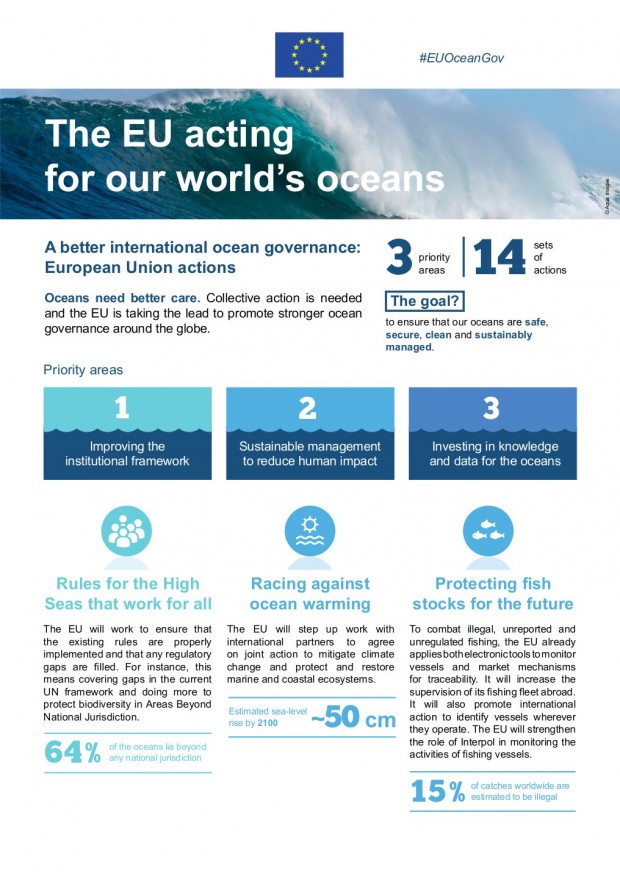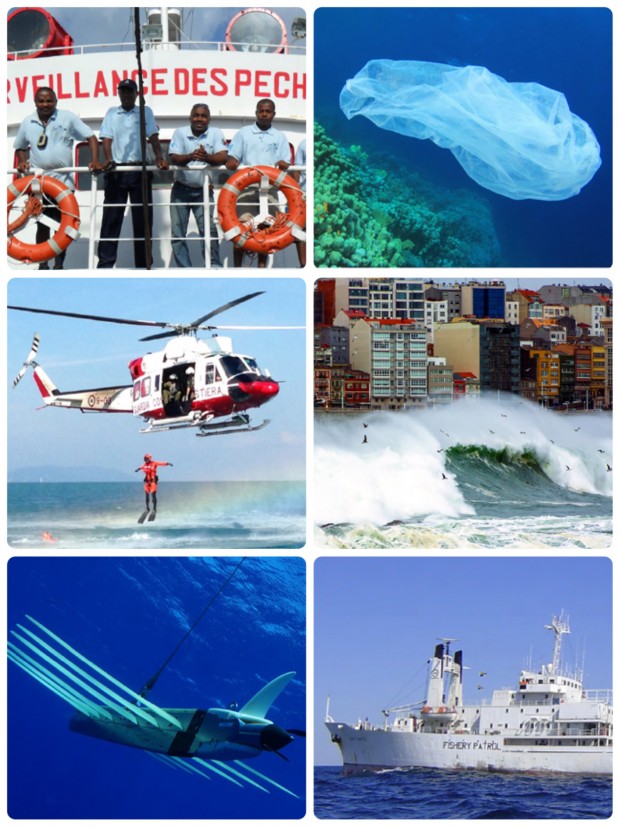International ocean governance: EU’s contribution for safe, secure, clean and sustainably managed oceans
EU News 360/2016
Brussels, 10 November 2016
The global ocean economy is estimated at €1.3 trillion. Climate change, poverty and food security are some of the global challenges that can be effectively addressed, if oceans are better protected and sustainably managed.
The Commission and the High Representative for Foreign Affairs and Security Policy adopted a Joint Communication today, proposing actions for safe, secure, clean and sustainably managed oceans. As a strong global actor, the European Union sets out an agenda for better ocean governance based on a cross-sectoral, rules-based international approach.
(...)
Today’s proposal sets out 14 sets of actions in 3 priority areas: 1) Improving the international ocean governance framework; 2) Reducing human pressure on the oceans and creating the conditions for a sustainable blue economy3) Strengthening international ocean research and data.
1. Improving international ocean governance framework:
Existing ocean rules need to be further developed and better enforced, for example to address areas beyond national jurisdiction or implement internationally agreed Sustainable Development Goals, such as creating the 10% target for Marine Protected Areas by 2020. The EU will cooperate with international partners to ensure implementation and will host in October 2017 the "Our Oceans" conference to build on these commitments. By 2018 the Commission will also produce guidance on the exploration and exploitation of natural resources in areas under national jurisdiction.
On the basis of its Maritime Security Strategy, the European Union will work with partner countries to reduce maritime security threats and risks, such as piracy, trafficking in human beings, arms and narcotics, while taking full advantage of the capacity of the new European Border and Coastguard Agency, the EU Maritime Safety Agency (EMSA) and Fisheries Control Agency (EFCA). Moreover, the EU is strongly engaged with its Common Security and Defence Policy missions and operations in the Mediterranean Sea and the Indian Ocean. EUNAVFOR Atalanta is active in countering piracy in front of the coast of Somalia, while EUNAVFOR Med Operation Sophia is working towards disrupting smugglers and traffickers’ networks and has saved more than 28.000 lives up to date in the Southern Central Mediterranean.
2. Reducing human pressure on the oceans and creating the conditions for a sustainable blue economy:
With the Paris Agreement having entered into force, the Commission will work to strengthen ocean-related action to implement national and international commitments, starting at Oceans Day at COP22 in Marrakech on 12 November 2016. As oceans absorb 25% of CO2 generated, they are important climate regulators. If no action is taken to limit ocean warming and acidification, oceans risk deregulating the climate.
Combatting illegal, unregulated and unreported fishing (IUU) is a priority for the EU. At least 15% of catches worldwide, worth €8-19 billion a year, are illegal. As a leader in the fight against IUU fishing, the EU will promote multilateral action including the creation of a unique vessel identifier, a global register and catch certificate and strengthen the role of Interpol in fighting IUU fishing. The Commission will launch a pilot project to monitor illegal fishing worldwide using satellite communications.
Marine litter is another major threat to oceans. Under the "Circular Economy Action Plan", the EU will propose by 2017 a strategy on plastics, which will contribute to reducing marine litter by at least 30% by 2020.
The Commission will work towards international guidelines on Maritime Spatial Planning by 2025 and help expand Marine Protected Areas worldwide with funding under Horizon 2020 and LIFE programmes.
3. Strengthening international ocean research and data:
An estimated 90% of the oceans’ seabed remains unchartered. Less than 3% is used for economic activity. More understanding and sound scientific knowledge is essential to sustainably manage ocean resources and reduce human pressure. The EU's Blue Data Network, the European Marine Observation and Data Network, provides data from over 100 marine research bodies and is accessible to all. The Commission will propose how to develop this database into a worldwide marine data network.
The proposed actions will now be discussed with the EU Member States in the Council and the European Parliament.
Source and additional information:
http://europa.eu/rapid/press-release_IP-16-3619_en.htm


Twitter: @EU_MARE URL













